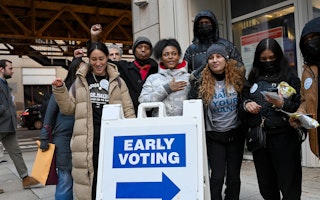Canaries in the Mine
By Josh Stroman
“It is easier to build strong children than to repair broken men.”
—Frederick Douglass
I am currently a fellow with the Leadership & Sustainability Institute for Black Male Achievement, a project of the Open Society Foundations’ Campaign for Black Male Achievement that is being co-implemented by nonprofits Root Cause and PolicyLink. I am proud to be working on a project that helps me help other leaders in the field, having come a long way myself.
In reflecting on the importance of promoting black male achievement, and where I am today, a big source of inspiration for this work comes from having had the opportunity to have my personal story lifted up on a national level in a campaign speech by then Senator Barack Obama. At the time I was a student at Benedict College—a southern, black, Baptist-affiliated college in Columbia, South Carolina—and had overcome quite a lot to arrive there. In short, I lost both parents before age 13, dropped out of high school soon after, and nearly succumbed to the worst stereotypes of young black men.
When Senator Obama addressed the audience in our church, he told my story, and concluded by saying, “Joshua’s story is a story we want to tell all across the country. It’s a story of going through hard times but overcoming. Joshua can’t do it alone, and I can’t do it alone even as president. It’s going to depend on the efforts of all of us. All of us are going to have to chip in. All of us are going to have to work hard… I look forward to working with you to help make Joshua’s all across this country.” I swelled with pride, as did my aunt, who helped raise me and fill critical gaps that others could not.
Obama’s affirmation of my story, combined with seeing him become the first black man elected as president a year and a half later, continues to mean a lot to me, and I believe that if other black men have access to this kind of affirmation and encouragement, along with other key supports to sustain ourselves, that we can grow and thrive.
In the spirit of promoting positive stories of black men and boys and lifting up successes to a national audience, the LSI’s Black Male Achievement Social Innovation Accelerator is a key strategy of the LSI to seek to ensure the effective continuation of our work to positively transform life outcomes for black men and boys in America. We will provide capacity building and showcase and spread what works by selecting and supporting a cohort of five Black Male Achievement Social Innovators. It is a national strategy that will provide BMA Social Innovators with the opportunity to join a cohort of fellow leaders to receive one-on-one capacity-building support, be connected and showcased to funders, and become national leaders in the field of black male achievement.
Exploding prison populations; controversial encounters between black men and law enforcement officers; misogynistic, homophobic, violent, and at times nihilistic rap lyrics have served as our “canaries in the mine,” instructing us not only about the condition of black men and boys in this country but also some of their responses to such conditions in light of real and perceived barriers to better opportunities.
Alternatively, President Obama’s acknowledgement that one young man can make it if he is encouraged and supported continues to sustain me and helps me to accept responsibility for my own success. And stories like mine are powerful when married to the stories of so many others who could achieve so much more, if as a collective community we respond forcefully and effectively to the task of dismantling every barrier and obstacle preventing forward movement from becoming a reality. It is my hope that the Black Male Achievement Social Innovation Accelerator can do that as well, and we can’t wait to meet the up-and-coming BMA Social Innovators.
A longer version of this post appears on the Leadership & Sustainability Institute’s blog here.
Josh Stroman is a fellow with the Leadership & Sustainability Institute for Black Male Achievement’s Social Innovation Accelerator at Root Cause.


